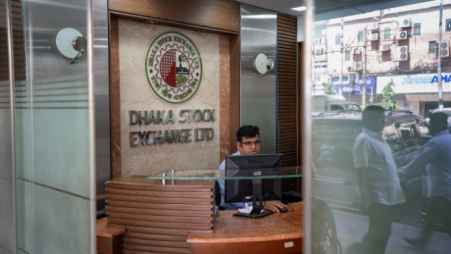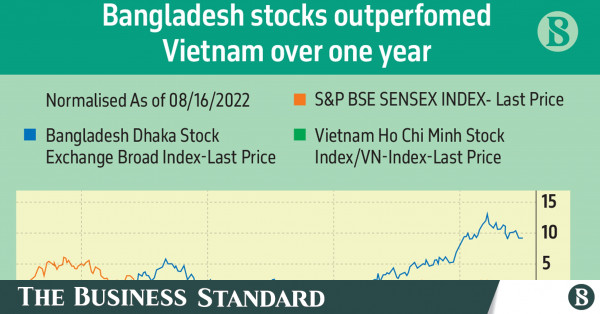Black_cats
ELITE MEMBER

- Joined
- Dec 31, 2010
- Messages
- 10,031
- Reaction score
- -5
HSBC says Bangladesh stocks have potential like India, Vietnam
16 August, 2023, 07:35 pm
Last modified: 16 August, 2023, 07:57 pm
Stock image of Dhaka Stock Exchange. Photo: Mumit M

Stock image of Dhaka Stock Exchange. Photo: Mumit M
Bangladesh's equity market deserves more attention from global investors as rising consumption and foreign investments boost the outlook for corporate earnings, according to HSBC Holdings Plc.
"Like India two decades ago or Vietnam a decade ago, it offers prospects for significant long-term capital appreciation driven by earnings growth," strategists Herald van der Linde and Prerna Garg wrote in a note dated Aug 16. Earnings are expected to grow 20% in the next three years, they said.
Globally, the emphasis on and recognition of ESG (environmental, social and governance) factors have grown significantly in recent years, leading to increased demand for transparency on ESG by companies.
The rare bullish view on the South Asian nation from a foreign broker signals a potential change in fortunes for the frontier market. Bangladesh is also on track to become a major consumer market by 2030, with the size of the population with daily income above US$20 (RM93) set to exceed that of Vietnam and the Philippines, according to HSBC.
Bangladesh's economic growth is forecast to average 7% in the five years through fiscal year 2027, according to the International Monetary Fund, making it one of the fastest-expanding nations in Asia. Gross domestic product growth averaged more than 6% in the past decade and its GDP per capita has recently overtaken India's.
Bangladesh recently allowed its currency to trade freely and adopted a unified exchange-rate regime, which allows for transparency and efficiency in foreign exchange transactions, benefitting businesses. It also secured a US$4.7 billion bailout from the IMF in January to fortify its economy.
To be sure, the country faces multiple risks including bad loans, price restrictions on stocks, a volatile currency, and potential political instability. The nation's equity market is also small — carrying less than 450 companies according to data compiled by Bloomberg — and illiquid. The Bangladesh Dhaka Stock Exchange Broad Index gained less than 1% this year after falling 8% in 2022.
Still, the country's banks should benefit from rising credit growth fuelled by high spending in infrastructure and factories, while its technology companies may gain from a push to make Bangladesh more digital, they added.

 www.tbsnews.net
www.tbsnews.net
STOCKS
Abhishek Vishnoi & Karl Lester M Yap, Bloomberg16 August, 2023, 07:35 pm
Last modified: 16 August, 2023, 07:57 pm
Stock image of Dhaka Stock Exchange. Photo: Mumit M

Stock image of Dhaka Stock Exchange. Photo: Mumit M
Bangladesh's equity market deserves more attention from global investors as rising consumption and foreign investments boost the outlook for corporate earnings, according to HSBC Holdings Plc.
"Like India two decades ago or Vietnam a decade ago, it offers prospects for significant long-term capital appreciation driven by earnings growth," strategists Herald van der Linde and Prerna Garg wrote in a note dated Aug 16. Earnings are expected to grow 20% in the next three years, they said.
Globally, the emphasis on and recognition of ESG (environmental, social and governance) factors have grown significantly in recent years, leading to increased demand for transparency on ESG by companies.
The rare bullish view on the South Asian nation from a foreign broker signals a potential change in fortunes for the frontier market. Bangladesh is also on track to become a major consumer market by 2030, with the size of the population with daily income above US$20 (RM93) set to exceed that of Vietnam and the Philippines, according to HSBC.
Bangladesh's economic growth is forecast to average 7% in the five years through fiscal year 2027, according to the International Monetary Fund, making it one of the fastest-expanding nations in Asia. Gross domestic product growth averaged more than 6% in the past decade and its GDP per capita has recently overtaken India's.
Bangladesh recently allowed its currency to trade freely and adopted a unified exchange-rate regime, which allows for transparency and efficiency in foreign exchange transactions, benefitting businesses. It also secured a US$4.7 billion bailout from the IMF in January to fortify its economy.
To be sure, the country faces multiple risks including bad loans, price restrictions on stocks, a volatile currency, and potential political instability. The nation's equity market is also small — carrying less than 450 companies according to data compiled by Bloomberg — and illiquid. The Bangladesh Dhaka Stock Exchange Broad Index gained less than 1% this year after falling 8% in 2022.
Still, the country's banks should benefit from rising credit growth fuelled by high spending in infrastructure and factories, while its technology companies may gain from a push to make Bangladesh more digital, they added.

HSBC says Bangladesh stocks have potential like India, Vietnam
Bangladesh's equity market deserves more attention from global investors as rising consumption and foreign investments boost the outlook for corporate earnings, according to HSBC Holdings Plc. "Like India two decades ago or Vietnam a decade ago, it offers prospects for significant long-term...



